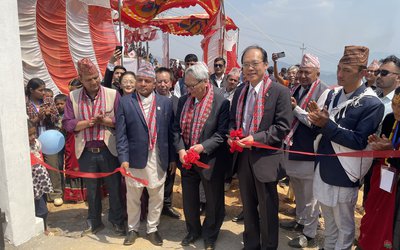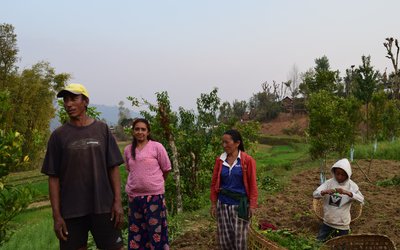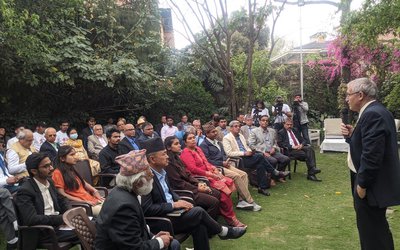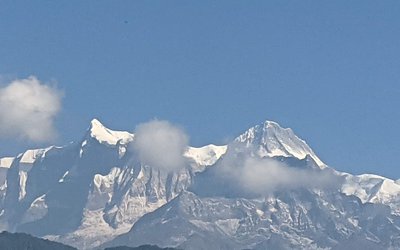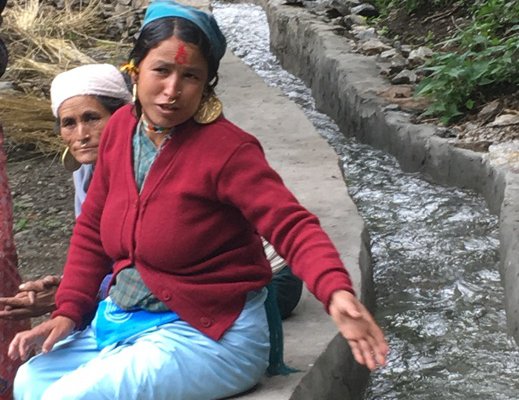
After showing how adaptation programs can be managed successfully, Nepal Climate Change Support Program (NCCSP) is now already in the second phase. With support from DFID, the program will be extended for another five years.
NCCSP is a significant government-led initiative to implement Nepali's National Adaptation Programme of Action (NAPA) focusing on Priority Component-1, that is, promoting community-based adaption by integrated management of agriculture, water, forest and biodiversity sectors.
This program aims to mainstream climate change adaption into Nepal's national development agenda and to contribute to achieve sustainable development goals by fostering poverty reduction, livelihood diversification and community resilience while ensuring the implementation of most urgent and immediate adaptation actions for poorest and most vulnerable communities. To do so, the NCCSP is implementing 100 Local Adaptation Plans of Action (LAPA) in 68 Gaupalika and Nagarpalika (former 87 VDCs and 9 Municipalities) of 14 climate vulnerable districts of 3 provinces-5, 6 and 7 namely Achham, Bajura, Kailali, Bardiya, Dang, Rukum, Rolpa, Dailekh, Jajarkot, Kalikot, Jumla, Humla, Mugu and Dolpa.
The NCCSP is also supporting efforts in building the institutional capacity of government and non-government stakeholders to implement Nepal’s Climate Change Policy and execute the most urgent and immediate adaptation actions to address the local adaptation needs and priorities. The NCCSP has supported initiatives to upgrade District Energy and Environment Units (DEEUs) of the 14 districts above to District Energy Environment and Climate Change Sections (DEECCS) by expanding their roles to climate change agenda and strengthening institutional capacity. Similarly, it established and strengthened capacity of local mechanisms-District Energy, Environment and Climate Change Coordination Committee (DEECCCC) and Village/Municipality level EECCCs at fourteen districts, 87 VDCs and 9 Municipalities. These local mechanisms are playing significant role in planning, implementation and monitoring of LAPAs.
So far, NCCSP has implemented more than 2431 local adaptation actions under six thematic areas namely: i) Agriculture, livestock development and food security; ii) Forest management and biodiversity; iii) Alternative energy; iv) Climate induced hazards and physical infrastructures; v) Human resource, capacity development and livelihood; and vi) Human health. From the implementation of adaptation actions of LAPAs for more than 600,000 (51 % women) climate vulnerable people, who have benefited directly and indirectly. Of the total actions, 40% focus on agriculture and food security and livelihood. These sectors are dominated by women's involvement.
As women are vulnerable to climate change, NCCSP ensures that the LAPAs it implements are gender-sensitive as much as they are inclusive, participatory and empowering. To do so, NCCSP has adopted GESI strategy that explicitly mentions 50% women participation and programme beneficiary, encouraging women to take part in climate change adaptation. The programme encourages women to take the leadership roles in EECC coordination committees, sensitizes and develops capacity of women through training and skill development activities. Likewise, NCCSP also encourages poor and vulnerable people to improve their livelihood through entrepreneurship training in income generating activities. Such activities have helped improve the livelihood of vulnerable people, specifically women, and eventually assisted them to adapt to climate change.
Vulnerable people, through orientation and awareness raising activities, have been able to understand climate change and its impact. They identify and articulate the need of adaption to minimize the effects of climate change. This programme has also been helping vulnerable communities to engage in income generating activities such as knitting and sewing, and other small enterprises, while building climate resilience structures such as deep-boring irrigation system, elevated community building, elevated toilets and hand-pumps in terai districts as well as irrigation canal, land-slide control measures, drinking water taps, water ponds, improved water mills, etc in the hilly districts. Introduction of flood and drought resistant varieties of various crops and vegetables to the smallholder farmers with supply of training and seeds remain highly beneficial in the flood and drought-prone areas.
Amongst several other activities under various themes of LAPA, this programme also promotes renewable energy technologies such as ICS, biogas, solar power and micro hydropower. Support in implementation of such activities have been helpful in reducing drudgery of women and at the same time lessening in-door pollution.
For its LAPA model, the NCCSP has been recognized internationally as a model project on climate change adaption to enhance adaptive capacity of poor and most vulnerable people. It stood as one of the best five projects amongst 170 submissions in a Global Contest call by NWP/UNFCCC in CoP 21. Similarly, it received the “People’s Champion” and “Honourabe Mention” titles in Global Photo Contest organized by the Adaptation Fund Board. These winner photos were displayed at World Bank headquarters in Washington DC during the Annual Global Climate Finance Readiness Seminar, and at CoP 22, Morocco.
The NCCSP is not only a model project for its LAPA but it also has explicitly translated Nepal's Climate Change Policy into practice by spending more than 80% of its total budget in the communities. This has highlighted and popularized government's on budget and on treasury fund flow system amongst the development partners.
The NCCSP is not only contributing to combined outputs of the NAPA but also providing learning opportunities in the formulation of the National Adaptation Plan (NAP). The MoPE is formulating the NAP based on NAPA and LAPA to address mid and long term adaptation needs in seven main themes and two cross-cutting themes.
Climate change is tremendously affecting people and livelihoods and there is a clear need of adaption to reach more vulnerable communities. The effectiveness of the programme has persuaded the development partners and other non-governmental organizations to scale up more LAPAs in vulnerable communities. At the same time, it is very important to support the vulnerable communities in sustaining their adaptive capacity built as a result of NCCSP intervention.
The NCCSP is in implementation since 2013 under the leadership of the Ministry of Population and Environment in close collaboration with the Ministry of Federal Affairs and Local Development and the Alternative Energy Promotion Center with financial support of DFID and EU and technical support of UNDP. At the local level, the District Coordination Committees (former DDC) of 14 districts are taking the lead role in implementation through Line Agencies, NGOs, Private Sector and Users' Committees.

Child friendly drinking water tap constructed under the support of NCCSP in Chhipra village of Humla district
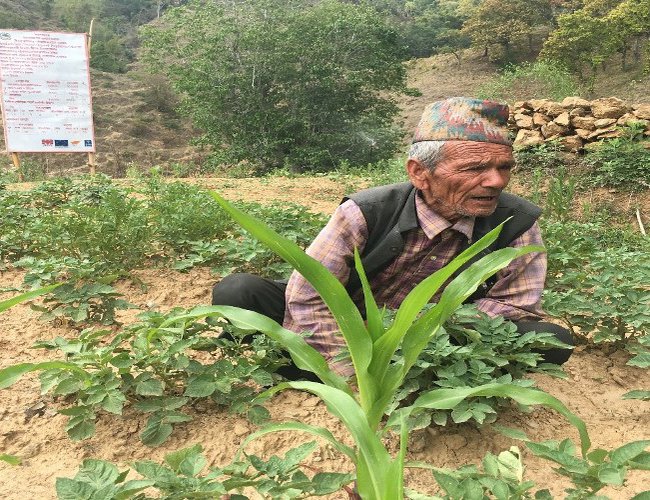
Vegetable farming supported by NCCSP in Parimela village of Dailekh district
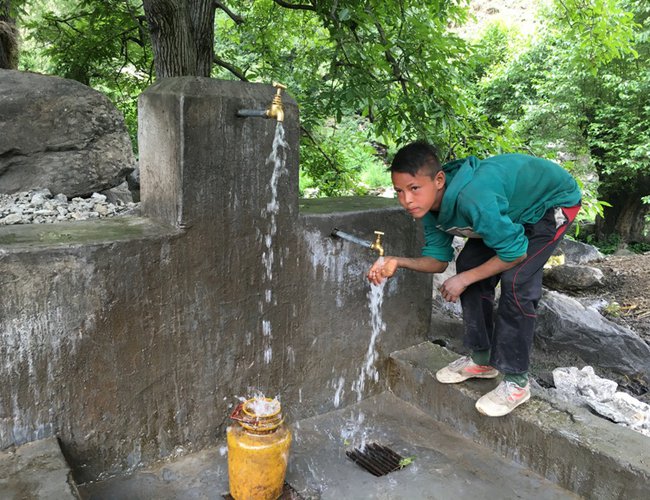
Child friendly drinking water tap constructed under the support of NCCSP in Chhipra village of Humla district
- TANAHU HYDROPOWER PROEJCT: A Significant Achievement
- Apr 15, 2024
- AMBASSADOR HANAN GODAR: Sharing Pain With A Nepali Family
- Mar 30, 2024
- VISIT OF KfW AND EIB TO NEPAL : Mission Matters
- Mar 25, 2024
- NEPAL BRITAIN SOCIETY: Pratima Pande's Leadership
- Mar 24, 2024
- NEPAL ARMY DAY: Time To Recall Glory
- Mar 15, 2024


